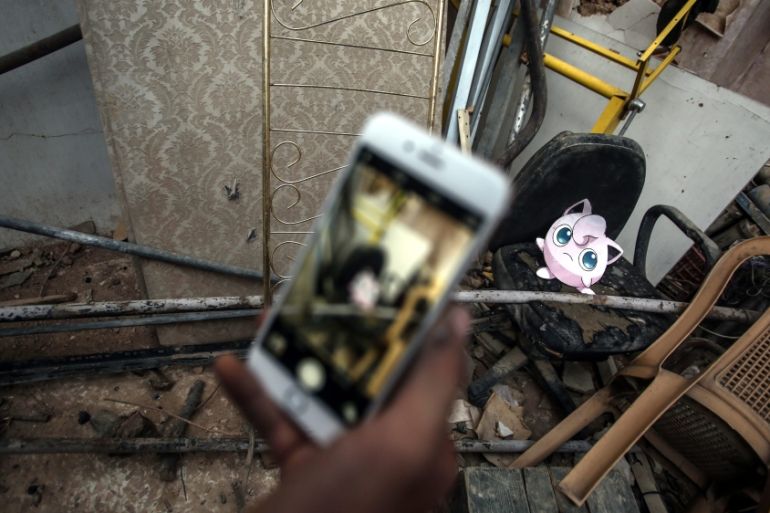Pokemon Go: When reality just isn’t enough
The whole enterprise feeds into the idea that life itself should be a video game.

As if human beings did not already have enough excuses for keeping their eyeballs permanently fixed on one variety of screen or another, a new all-consuming distraction has burst forth into existence to further challenge the apparent tedium of reality.
The phenomenon, of course, is Pokemon Go, the “augmented reality” mobile phone game that debuted in early July and rapidly amassed more daily users than even such institutionalised addictions as Twitter.
Keep reading
list of 4 itemsBoeing’s jets turn 70: A timeline of highs, lows and turbulence
US university ties to weapons contractors under scrutiny amid war in Gaza
Scientists discover sperm whale ‘phonetic alphabet’
It has soared to unprecedented popularity especially in the United States, where its developer – Niantic Inc – is also based.
So what are the mechanics of this ever-so-stimulating entertainment?
Basically you follow a satellite-generated map on your phone that directs you to locations where you can catch colourful little monsters – Pokemon. Once you arrive in the vicinity of a particular monster, you switch on your phone’s camera, and the Pokemon’s image appears superimposed over the actual physical landscape in front of you.
You capture the Pokemon with a swipe – or several – of your finger, and then other scintillating stuff happens.
Although the game is free to download, there are naturally plenty of in-game items available for purchase along the way.
According to a Forbes article published online on July 26, Pokemon Go was already estimated to be “hauling in as much as $6m a day from in-app purchases in the US alone”.
After all, what’s the point of anything this day and age if it can’t turn a profit?
Life as video game
At first glance, Pokemon Go might seem at least less pernicious than other experiments in reducing the human race to automaton status, in that it forces players to get out, move around, “experience” things – and perhaps crash into a police car or get robbed in the process.
But the fact is that the whole enterprise still feeds into the idea that life itself should be a video game – which happens to be the same premise that underlies, for example, the high-tech warfare of drones and other methods of remote-control killing.
READ MORE: Artist Khaled Akil imagines Pokemon Go in ravaged Syria
Perhaps fittingly, the US military magazine Stars and Stripes reports that, shortly after Pokemon Go’s debut, virtual monsters were spotted at US military bases overseas.
The report quotes a US Army specialist in Germany – who with his wife set up an online group for Pokemon Go aficionados – as expressing his appreciation for how the game “gets everyone in the community off their feet and ready to move”.
Persons chasing their phones from landmark to landmark are liable to attract disproportionate attention from law enforcement if they happen to be of Arab/Muslim appearance.
As we all know, the US armed forces aren’t generally associated with a lack of movement and activity – and in fact Germany itself serves as a primary hub for punitive US military manoeuvres, including drone strikes entailing heavy civilian casualties.
Nothing like a bit of augmented reality on bases to help distract servicemen from the real reality of the system they help to sustain.
This is not, obviously, to suggest a parallel between Pokemoning and military murder. It bears reiterating, however, that dehumanisation – a theme relevant to both obsessive video gaming and the bellicose escapades of nations – is an inevitable effect of technology that converts environments and their living contents into coordinates and targets.
In the end, little room is left for empathy.
Realities colliding?
Augmented reality is, of course, not an option available to all inhabitants of the globe, many of whom are instead confined to regular old reality, as boring or brutal as it may be.
And it’s presumably not particularly encouraging for victims of war in places such as Syria and Yemen – or victims of hunger everywhere, or migrants risking their lives in search of a dignified existence – when news headlines regarding their plight have to compete with headlines about the mind-boggling popularity of a monster-capturing game.
There’s also a good chance that, thanks to the advent of Pokemon Go, certain realities will start to collide.
READ MORE: Pokemon Go ignites debate in the Middle East
In terror-paranoid Europe these days, for example, persons chasing their phones from landmark to landmark are liable to attract disproportionate attention from law enforcement if they happen to be of Arab/Muslim appearance.
Ditto for the US, where other persecuted demographics are likely to also pay a price for diversion.

Given that, in the very recent past, American blacks have been shot by police for infractions such as lying on the ground with their hands in the air, it’s a safe bet that Pokemoning While Black could also be a risky business.
When Pokemon Go was initially released, Niantic Inc enjoyed access to vast amounts of users’ personal data.
If this is the future of reality, we could really use an escape.
Belen Fernandez is the author of The Imperial Messenger: Thomas Friedman at Work, published by Verso. She is a contributing editor at Jacobin magazine.
The views expressed in this article are the author’s own and do not necessarily reflect Al Jazeera’s editorial policy.
